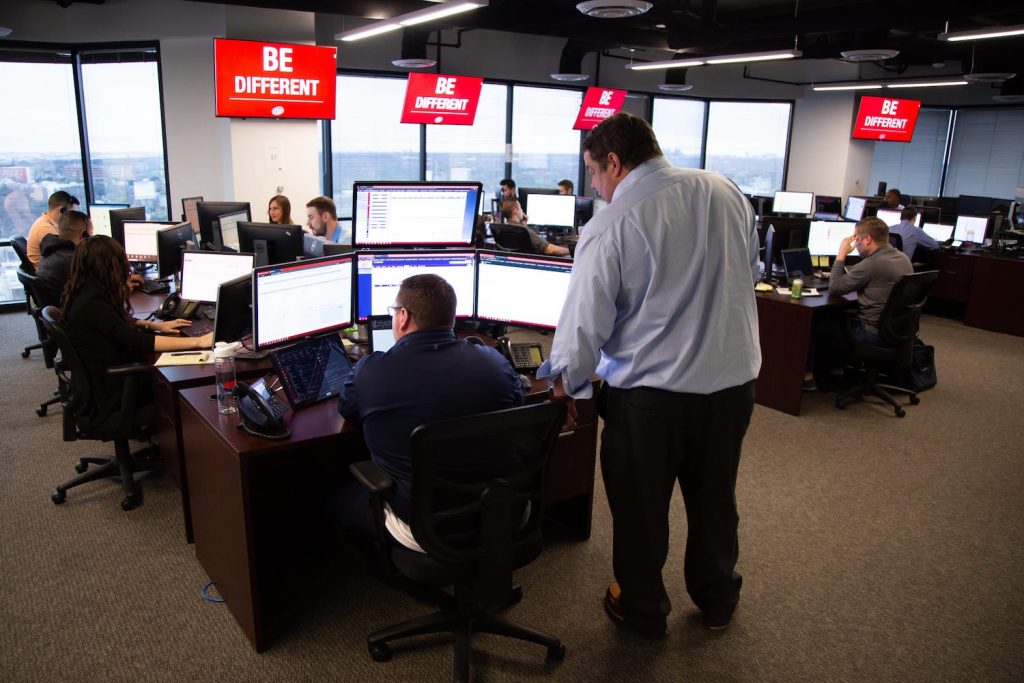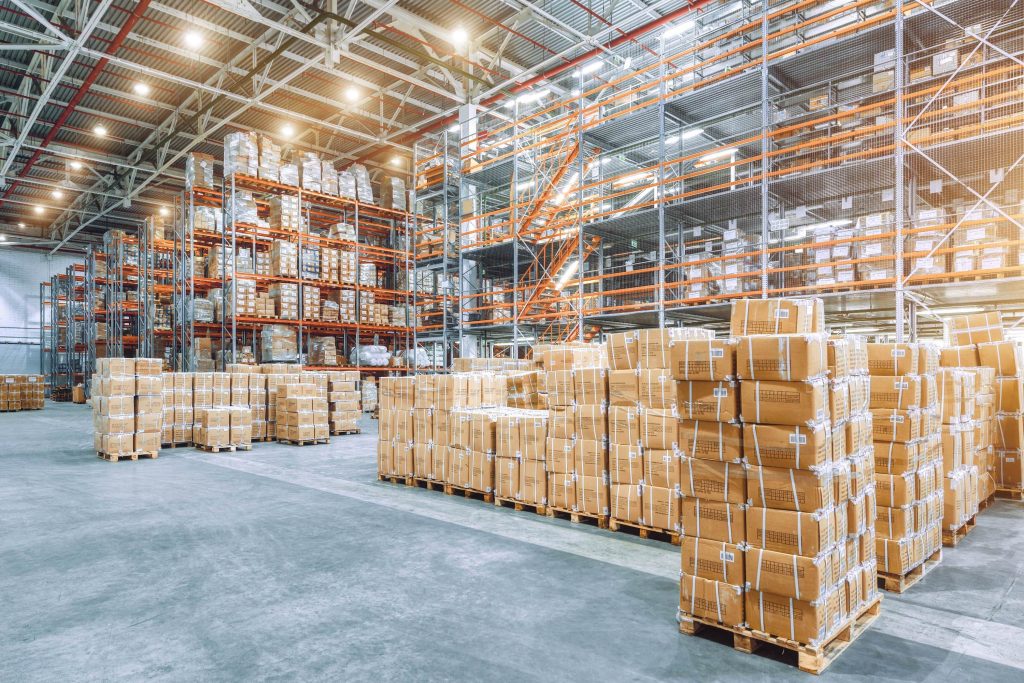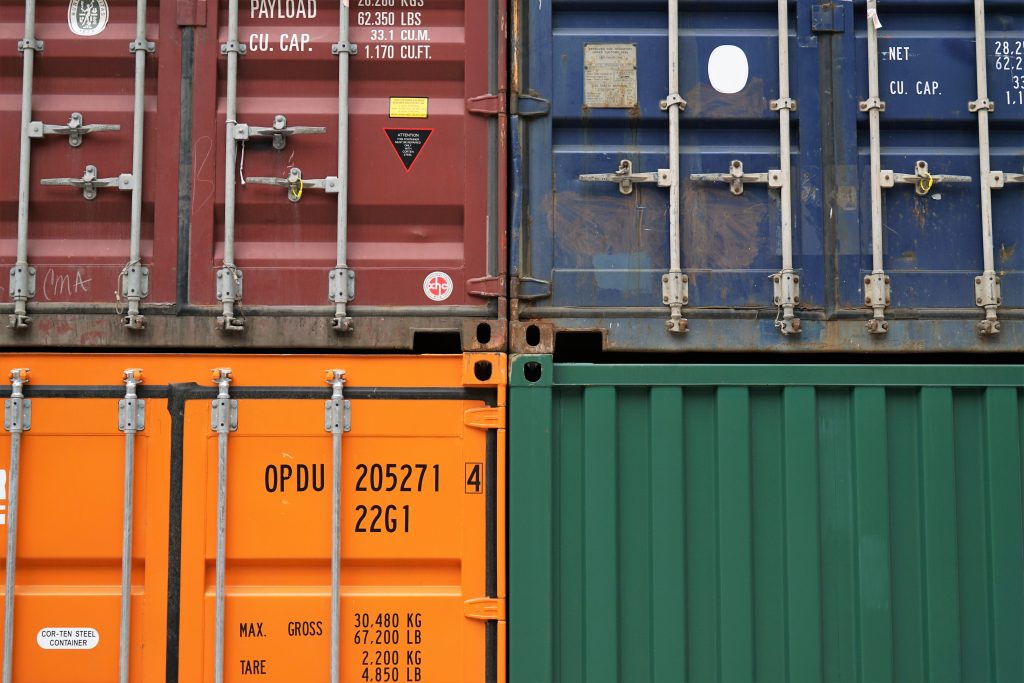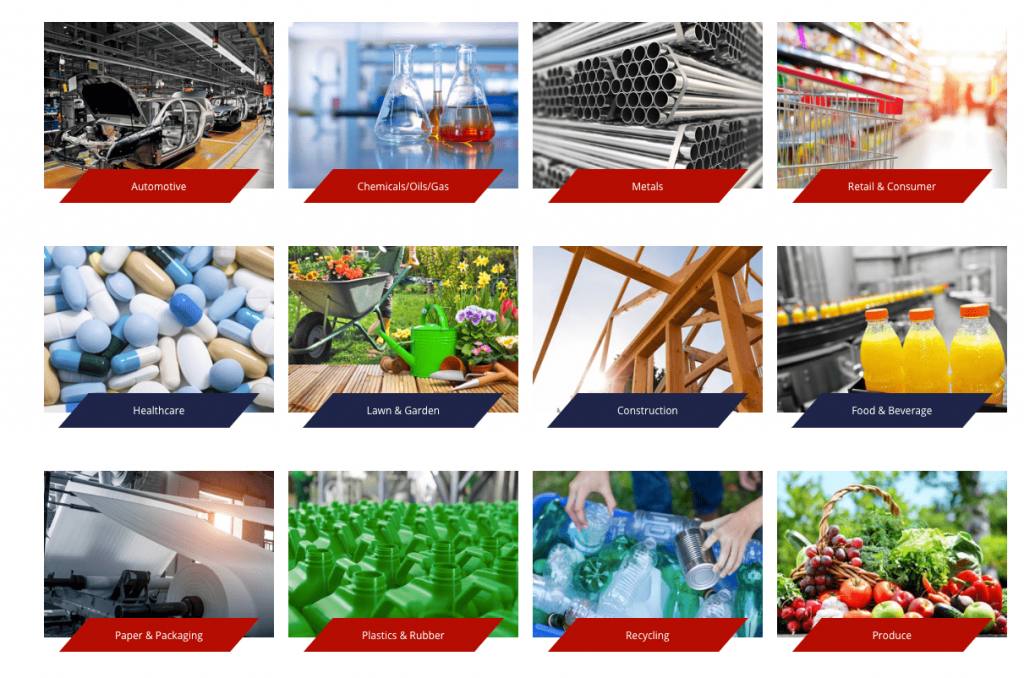Have you ever stared at groceries on a store shelf and wondered how they ended up there? The answer: 3PL (aka. Third Party Logistics). It takes a lot for suppliers to transport every product to all corners of the world, so they depend on logistics, specifically third-party logistics.
In this definitive guide, we explain everything you need to know about 3PLs – what they do, who needs them, and how to find the right partner for your organization.
Table of Contents
What is a 3PL?
3PL firms, or third-party logistics providers, take over distribution and logistics work from one company and then create better, faster distribution channels.
If a can of tuna is on the grocery store’s shelf, it likely came from a manufacturer that used a 3PL firm to distribute across regions and different grocery stores.
3PLs provide many functions for firms, including order distribution, warehousing and resource management, and inventory.
These 3PL firms handle shipping, inventory, packing, and returns in the eCommerce market. This process is even visible in online order tracking features where you might see a distributor pick up your item.
This distributor is often a 3PL firm responsible for promptly getting your product to your doorstep. A 3PL firm has to do this because not all suppliers have a presence in your local market.
Experts say that most companies outsource their logistic functions because the 3PL firms create more efficient distribution networks. This shift is because 3PL firms have the expertise and logistic network access needed to handle the scales of supply chains and logistics required.
3PL firms can negotiate better rates with carriers and suppliers, encouraging small, mid-sized, and even large-scale firms to utilize 3PL firm distribution and logistics services to get volume discounts.
The firms have market density, and research shows that 3PL firms can help the firm overcome market uncertainties.
What Do 3PL Companies Do?

A third-party logistics company outsources shipping, storing, and distributing through a vast network of shippers and owner-operators. A third-party logistics company has access to different resources most companies cannot access, and their goal is to streamline shipping processes to minimize costs. Companies that provide 3PL services offer many services like order fulfillment companies.
These services include:
- FTL and LTL freight shipping
- Picking and packing
- Warehousing
- Inventory management
- Shipping and receiving
- Kitting and customization
- Reverse logistics
- Kitting and customization
3PL vs 4PL: What are the Differences?

Let’s start with the basics of 3PL vs 4PL: what do they mean? Third Party Logistics (3PL) and Fourth Party Logistics (4PL).
Logistics is the method of controlling the flow, warehousing, and supply of goods in a market or business. It is a part of supply chain management where all information and operations are managed regarding how the goods will get from point of production or origin to the point of consumption.
Third Party Logistics is the process of outsourcing business supply chain logistics to a third-party or another firm. 3PL can be a system of services that manage the supply and transport of goods from one firm to several market destination points around the world.
Usually this is done because the 3PL firm has the capacity, networking ability, and resources to engage with new markets, negotiate supply chains, and facilitate large-scale supply transport and warehousing.
Fourth Party Logistics typically directs every moving part within the customer’s supply chain and serves as a single point of contact for all parties involved.
3PLs can be one of several points in the supply chain process for the customer and can be one of many managers of the supply chain. 4PLs are the main points of the supply chain and are solely tasked with the control and management of supply chain operations.
3PL vs 4PL: How are they Different?
The essential difference between the two is that 3PLs oversee outsourced services while 4PLs look after supply chains.
The degree of complexity in the supply chain and the greater control in 4PLs separates the two. If you want to surrender all control and have a specialist firm manage your supply chain, 4PL might be the better option.
3PLs are seen as transactional, as collaborative measures with the client and can be good options for firms who can still handle their customer base and have simpler supply chains.
Another crucial difference is that 3PLs are more popular in the supply chain market. Let’s consider the market for each of them. The market value for 3PL exceeded 1 trillion dollars in 2019.
86% of shippers have declared that the 3PL method helps businesses by creating better customer service relations.
Conversely, the world 4PL market value was recorded as 56,472.1 million dollars in 2019 and is predicted to rise to 78,981.5 million dollars in the coming decade. This means that the 3PL market is booming while the 4PL market is still in its initial stages.
3PL vs 4PL: Which is Right for Your Business?
We are comparing 3PL vs 4PL, and both are excellent options. However that doesn’t mean that either one will always work well for you.
This is why you need to figure out which one is the right fit for your business. The following questions can help you figure that out.
What Can You Afford?
While 4PLs might be attractive to business owners who want to expand their market and relinquish strategic control, 4PLs cost far more. This is why most mid-sized and smaller companies often go for 3PL firms because they are more affordable. When selecting a Logistics Provider, you need to consider their costs and whether they fit into your budget.
What Are Your Strategic Goals?
3PLs tend to work better for businesses that have the capacity to handle and control their logistics and strategic goals in the short term and long term. 4PLs are often recommended for those firms that require outside intervention in their strategic goal alignment, logistics and supply chain management. If your business is not meeting set strategic goals, you could consider outsourcing the task to an external resource.
How Complex is Your Supply Chain?
One final thing you need to consider is the complexity of your supply chain. 3PLs tend to be better fits for businesses which have simpler supply chains while 4PLs handle more complex supply chains.
6 Advantages of 3PL
1. Reduce Overhead Costs
Third-Party Logistics companies are the best at what they do, plain and simple. They are the experts in their field and thus have more knowledge than their supply chain function. They will often have already established relationships in the industry, which positions them ahead of the game. They will be better at negotiations and better at securing discounts for their particular clients. The short of it – they will save you money. A 3PL can do it all.
2. Open the Door to More Know-How
The current global market is both complicated and complex. It’s hard to get a handle on everything occurring and anticipate what will happen next. However, with a 3PL provider, you can do those things plus more. They are familiar with transport documentation, import and export, international compliance and economic regulations, and beyond. Businesses looking to expand into global markets can benefit from the logistics support and know-how their 3PL partner can provide, thereby reducing costly delays, cutting down the cycle time, and making entry into a new region or delivery area trouble-free.
3. Streamline Your Skills
Looking externally for a logistics provider will leave your company with more time on its hands to focus on getting the job done. Outsourcing is the way to go – your business has one non-core but essential element taken off their plate and has the reassurance that their logistics operations are taken care of by a professional. It’s a win-win and will enhance both your company and your partnering logistics company.
4. Acquire Increased Scalability and Flexibility
Third-party logistics in supply chain management offers enterprises the flexibility and scalability to utilize supply and distribution resources based on current business needs. Redistributed resources prevent redundant investments and under-utilized resources when sales are down. Enterprises can quickly upscale when demand surges.
5. Enable Business Growth and Market Expansion
The primary purpose of third-party logistics in supply chain management is to enable business growth by allowing companies access to new markets. Managing inventory in a new market without spending money on warehousing, equipment, and labor can save dollars. Most small businesses cannot invest in large-scale shipping operations because they lack the resources required to fuel, maintain and operate a fleet. Outsourcing transport needs to a third party enables the business to grow but stay within budget.
6. Increase Client Contentment
Combining all advantages above makes it easy to see why outsourcing logistics to a 3PL provider will increase overall client satisfaction. Response times within your company will be both better and more reliable leading to more satisfied clients – the ultimate goal of all businesses.
5 Advantages of 4PL
1. Trusted Advocacy
4PLs, also referred to as Lead Logistics Providers, direct every moving part within the customer’s supply chain and serve as a single point of contact for all parties involved. 4PL providers take logistics services up a notch as they naturally have a much larger degree of involvement in business operations. They strive to improve their client’s supply chain procedures at all times. Commitment between 4PL providers and their client is long-term, and it goes beyond transaction provisions.
2. Customer Connectivity
There are many ways these days that consumers and retailers are connecting (new outlets materializing daily), and the supply chain management process is likewise evolving. Online options have spurred brand new consumer habits. People spend less time in-person with retailers and rely more heavily on online interfaces and chats for their customer service connections.
While this idea is circulating that digital communications harm the customer-company dynamic, 4PL providers can improve customer relations for their B2C clients by keeping consumers in close contact with their purchases. When 4PL’s take on a client’s logistics needs, they also take on the needs of their customers and, as a result, increase brand trustworthiness and loyalty.
3. Improved Core Competencies
Operational improvements designed to streamline work and eliminate inefficiency allow 4PL logistics clients to reduce their spending habits. These improvements can leave company resources accessible and available for redistribution.
4PL service adoption aids companies hoping to redistribute much-needed resources away from wasteful logistic practices and directly into the company’s core competency efforts. By focusing on a company’s core foundations while allowing 4PL experts to handle the distribution of products, clients find they can keep everyone focused on their primary tasks. When you properly direct your logistics, productivity can only increase.
Just like a business knows their product and clients, so, too, do 4PL providers. Trusting 4PL providers to oversee an area they are experts in improves company efficiency.
4. Corporate Expansion
If growth and buildout is a sole goal of a particular company, then 4PL providers can quickly spirit that vision into reality with minimal disturbance to the company’s day-to-day. 4PLs have access and relationships within the supply chain industry to assist businesses.
Think of 4PLs as supply chain architects. They build and bolster reliable networks to support a growing company’s logistical needs. They are often already in good standing with both national and international partners. Developing systems for the efficient execution of the flow of goods can be seamlessly accomplished with the right 4PL provider.
5. Corporate Clarity
4PL providers are the only contact point between their client and their supply chain process, streamlining the entire process. Fourth-party logistics providers oversee and manage the complexities of a company’s logistical operations from start to finish.
Having a singular contact point to coordinate each logistics step throughout every link of a company’s supply chain, from material sourcing, manufacturing considerations, and last-mile solutions provides a unique look into a company’s overall operations.
Who Uses 3PL?
The short answer is everyone. From small eCommerce stores to medium-sized firms to large-scale companies, all kinds of firms utilize 3PL.
Small e-commerce shops on Etsy use 3PL distributors and carriers to get their products from their production locations to customers.
Getting a silver charm bracelet from Dallas, TX, to New York, NY, will be expensive if a small business creates a supply network.
Using 3PL networks, they can get the products packaged, distributed, and delivered quickly and cheaply. The same is true for medium-sized firms like a chain of beauty stores that need 3PL firms to distribute and preserve their shampoo products.
According to a Reuters report, even retail giants like Walmart are taking advantage of 3PL distributors to manage some of their 23 distribution centers and the 6.3 billion annual packages processed there.
Firms like Walmart use third-party firms because it is easier to manage the volume of the products for their 260 million customers, particularly when the customer trends have begun to shift towards e-commerce sales instead of in-house buying.
Top industries that can benefit from 3PLs:
- Electronics Manufacturers and Distributors
- Cosmetics Makers
- Pharmaceutical Companies
- Trade Show Transportation
- Large and Small Retailers
- Industrial Machinery
- Manufacturers
- Restaurant Equipment and Supplies
- Aerospace Industry
Why Should I Use a 3PL for My Business?
Your 3PL will manage shipping problems that shouldn’t cross your mind
As if producing quality products, worrying about employee satisfaction, client happiness, and budget management were not enough, imagine throwing inventory storage, shipping (along with making sure orders are on time, undamaged, etc.), and distribution on top of this nightmare.
Your 3PL company establishes supply and distribution chains from multiple sources. For most clients, outsourcing this work is more efficient than spending hours of research and thousands of dollars in staffing to end up with supply lines that siphon your revenue.
What Are the Advantages of 3PL?
Companies use 3PL techniques for several reasons:
3PL Reduces Costs
If the company chooses 3PL methods, they can save a lot of money on transportation, warehouse infrastructure, labor costs, and technical expertise and resources. A 3PL company can handle these functions, so it does not have to invest itself. The 3PL company can negotiate lower logistics and supply volumes rates and open new markets and industrial networks. A company on its own cannot extend these factors as effectively.


3PL Allows Growth
In any company, 3PL allows for business and market expansion. The 3PL firms can handle market logistics and inventory for the growth of a new company.
If a preserved fruit company wants to expand its business and enter new markets, the 3PL firm can handle its entry. They will help manage supply chains by organizing warehousing tactics and labor expansion.
3PL Allows Scaling
Companies often do not have the luxury to increase or decrease their production scales quickly. However, 3PL companies can allow the company to scale its supply up and down based on the business requirements and market forces. The 3PL company will keep an eye out for demand increases and surges to optimally utilize investments and firm resources and increase production when required. Because the 3PL firm works with core functions, strategic logistic processes are optimal.

3PL Small Business Benefits:
Successful companies of all sizes understand the value of partnering with an experienced third-party logistics provider. Working with a 3PL can provide your business with the benefits of modern warehousing and distribution facilities without adding unnecessary costs. 3PLs have the infrastructure and expertise to lower the overall costs of your supply chain operations.
Today’s 3PLs provide many services like quality checks, packaging, labeling, bulk breaking, and last-mile distribution. Most small and medium businesses face operational challenges when managing multiple departments in one professional space; these companies may not have the required infrastructure to address a multi-functional facility’s complexities.
3PLs offer flexible storage capacity, with multiple customers to even out seasonal demand variations within the same facility. Working with a 3PL can pay for what you need and protect yourself from changing warehousing requirements and costs.
Regularly reviewing your operational processes ensures your business constantly improves. Analytics offers insight into your efficiencies and overall warehouse management, revealing the number of units you move and highlighting areas that need attention. Embed analytics in your warehouse IT infrastructure capture accurate data.
A quality 3PL provider has robust analytics tools already in place with the experience of providing their customers accurate reports of their products and detailed information on each SKU and its performance.
A third-party logistics provider has the equipment, space, labor force, and industry expertise to provide value-added services – and with the skill to ensure a smooth flow of operations. Bundling all the services offers their customers savings in cost and time and improves the overall warehousing experience.
A quality 3PL provider has the experience and long-standing relationships to fit all these pieces efficiently. By delegating the logistics puzzle, you are free from managing multiple partners; plus, your 3PL provides a single-point solution for all logistics needs. With your 3PL handling the many supply chain third parties they work with, they will be able to see the overall picture of your entire supply chain and provide a strategy to help your business achieve long-term goals.
How to Find a Reliable 3PL in 2022
Order fulfillment is a large part of many businesses in 2022 but proper logistics management and execution can be difficult. There are a variety of factors to consider when you’re tasked with getting a package from Point A to Point B. For this reason, many businesses, both big and small, choose to use third-party logistics (3PL).
Yet with so many 3PL options, it can be hard to know which company will be the most dependable and appropriate for your needs. So how can you do it? Use these tips to find out what your business should look for to find a reliable 3PL in 2022 and beyond.
What to Look for in a Reliable 3PL
In a way, 3PL firms like R2 Logistics keep the world running. They get products to the store and your doorstep. Although the 3PL industry faces significant climate and economic challenges, researchers predict 3PLs will continue their pivotal role in the global economy.
Not every 3PL will work for your business needs. However, there are several, significant factors you should consider when searching for a reliable 3PL company.
#1 Technology
One of the easiest ways to determine whether a 3PL is reliable is to see if they keep up with the latest logistics technologies. Better and newer technologies help 3PL companies do their jobs well and streamline their operations. This ultimately helps your business and your customers operate more efficiently and effectively.
#2 Financial Stability
As a potential partner, you will want to ensure that any 3PL you work with is financially stable. Some signs of financial stability from a 3PL are a consistent cash flow, acceptable profit and loss data for the past few years, and investments in resources to protect and optimize your operations. A stable partner makes for a stable working relationship.
#3 Flexibility and Scalability
Flexibility and scalability are also key to a long-term relationship with a 3PL. You want a 3PL company to be able to handle your current logistics needs, as well as your projected needs as your business grows. A reliable 3PL should be able to accommodate the growth of your business and help you to expand into new markets.
#4 Reputation
While researching 3PL companies, you should consider how many long-term clients they have, what those clients’ opinions of the company are, and how long they have worked with their clients.
A good reputation goes a long way in establishing a 3PL as a reliable business partner.
#5 Communication
The last factor in reliability is communication. It is perhaps the ultimate factor in a relationship between a business and a 3PL. They are your partner, and as your partner, they need to communicate with you regularly.
A reliable 3PL should be able to provide insight, metrics, and reports on the logistics of your business to ensure your operations are running smoothly.
Conclusion
In a way, 3PL firms like R2 Logistics keep the world running. They get products to the store and your doorstep. Although the 3PL industry faces significant climate and economic challenges, researchers predict 3PLs will continue their pivotal role in the global economy.
Industries R2 Logistics Serves

